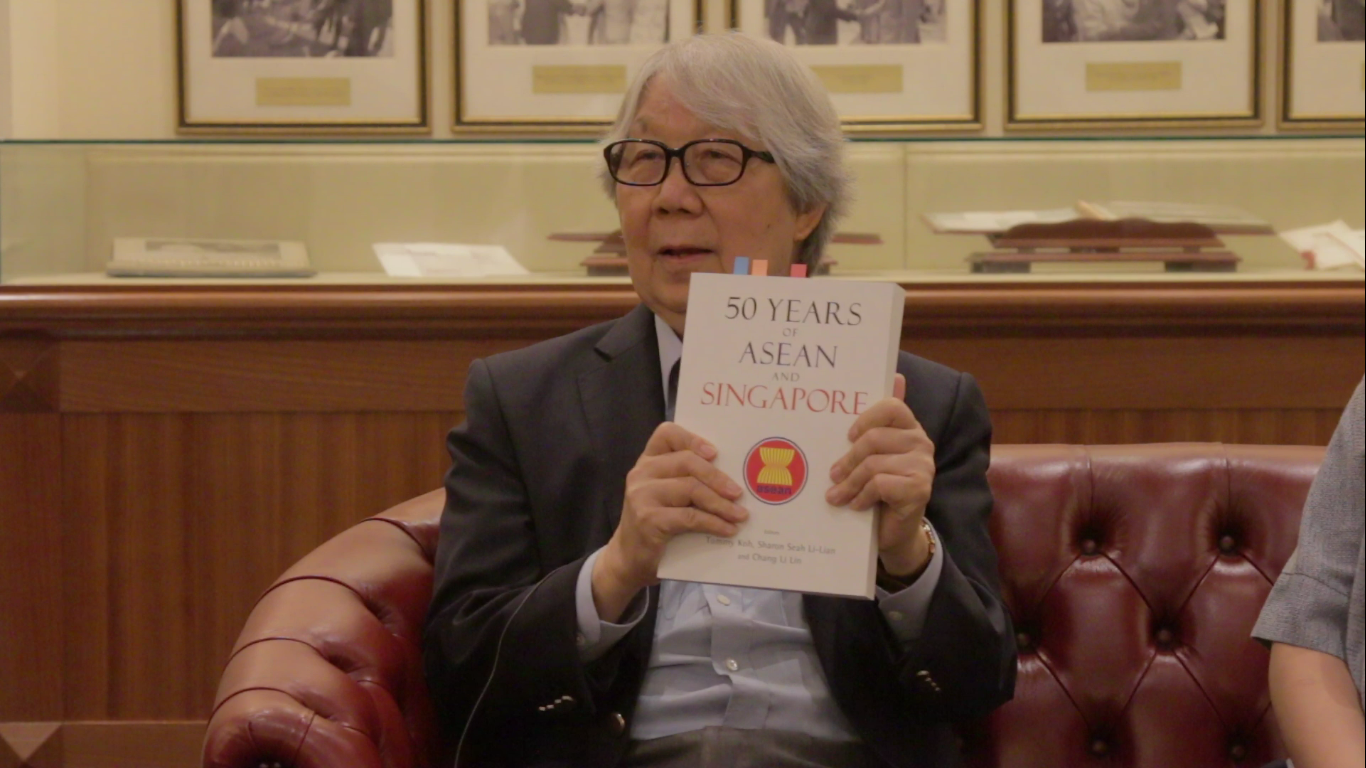If there is one thing Ambassador-at-large Professor Tommy Koh and we can agree on, it's this: that Singaporeans do not care much about the Association of Southeast Asian Nations (ASEAN).
He says it's like the United Nations, or any other regional or international organisation, that doesn't offer immediate, tangible, "bread-and-butter" benefits for the average Singaporean.
"So Singapore was celebrating the 60th anniversary of the UN founding — it was a teachable moment, and there were a lot of skeptics, you know, saying what has the UN done?
My reply to all of them is, can you imagine a world without the UN? A world without the UN would be even more lawless, more violent, and would be an even more dangerous place for small countries. The UN general assembly is like the parliament of the world — whether you're big or small, you have an equal voice, you have an equal weight, and it's a democratic institution."
So it is with ASEAN, says Koh, who at the ripe age of 79 has seen Singapore through the Second World War, and more importantly, was out and about making friends with the world's superpowers and countries many times larger and more intimidating than us in the heat of the Cold War.
And if there is anyone who can talk about the world, the region, the Pacific, China, India, Japan — it's him. He spent 13 years as our Permanent representative to the UN, and for a time was also ambassador to the U.S..
Koh was President of the UN Conference on the Law of the Sea (which is still completely relevant today) and also chaired the UN Conference on Environment and Development in the early 80s and 90s respectively.
He also happens to be a longtime fan and scholar of ASEAN.
Proving everyone wrong by virtue of its existence
Koh makes no bones about the fact that ASEAN has more detractors than admirers, but feels that isn't right.
So strongly does he argue about the case for ASEAN and for Singaporeans to recognise its importance that he worked together with two editors, Sharon Seah and Chang Li Lin, on a new book commemorating its 50th anniversary, which he will be launching this evening (Tuesday, August 22).
Koh recently was at a commemorative ceremony in Manila where Philippine President Rodrigo Duterte presented tokens to family members of the five ASEAN founding fathers (foreign ministers of Indonesia, Malaysia, Singapore, Indonesia and the Philippines). Singapore's first foreign minister, the late S. Rajaratnam, had no children, so Koh, who was the executor of Rajaratnam's estate and a close friend of his, attended in his stead.
"If you put yourself in Mr Rajaratnam's shoes and think about ASEAN, I think in 1967 the expectations were quite low because the region was in turmoil. And although we are neighbours, but we are more strangers than partners. Because we were ruled by different colonial powers, our eye was always to the colonial power and not to our neighbours.
So when these five founding fathers took a leap of faith and said let's start a regional organisation, I think they didn't have very high expectations. In fact most of the pundits predicted ASEAN would die in its infancy you know, and we proved them wrong that in spite of all the odds, we managed to make ASEAN survive, and not only survive, but to prosper and to periodically reinvent itself, embrace a higher ambition, accomplish it and go on to the next pinnacle. So it's been a happy story."
ASEAN's achievements
So Koh educates us on the list of things ASEAN has achieved in its half-century of life:
1. Keeping the peace in Southeast Asia for the past 50 years —
this, he argues, alongside Kishore Mahbubani, should qualify us for a Nobel Peace Prize, just like how the European Union was given one for preserving peace among them for 60 years.
2. Merging ASEAN's 10 economies into a single market —
throughout the time of peace, all our member nations have grown, prospered and integrated with one another.
3. Becoming a force of peace within the Asia-Pacific region
ASEAN has over the years become the place of gathering for regional countries, major powers and other stakeholders, by organising institutions and forums for discussion on political and security issues, challenges, and also, crucially, to prevent and avoid war.
The recent ASEAN regional forum, for instance, saw North Korea's foreign minister sit at the very same table as his counterpart from South Korea.
"Although people say that we shouldn't be too boastful about this role that we play and that we may be in the driver's seat but sometimes we don't give the commands on where the car should go.
So I don't use the figure of the driver's seat. I'd rather say that because we are united and we are independent and neutral, we are trusted and accepted by all the major powers, you know. And we play the indispensable role of being the convener, and the neutral chairman of this region's institutions and forums."
The threat of rising powers, and the competition for influence
Koh also recognises that this, an issue increasingly relevant today, does pose a threat to the neutrality, stability and unity of ASEAN.
"So my hope is that ASEAN leaders will have the wisdom to understand that our relevance and usefulness to the world is conditional on our remaining united, independent and neutral. and if we lose any of those three things, we will no longer be acceptable as a convenor and chairman of these institutions and forums. so a lot is at stake and the dangers are real. I don't underestimate the dangers."
And it's not just about, for instance, U.S.-China relations that may affect us as a whole. China also has tensions with India and Japan, both of whom we are good friends with.
So we want to remain good friends with all four parties — the U.S., China, India and Japan — but we must also avoid taking sides in their tensions or conflicts, Koh says. This is also the foreign policy of ASEAN: to be friends with everyone but to avoid being aligned with any of them.
[related_story]
Dealing with contentious issues that involve ASEAN members
So the next question is, what happens when ASEAN members are involved in a conflict with an external country?
One of the most immediate issues to come to mind about this would be the South China Sea dispute, of which four of ASEAN's members are claimant countries (Malaysia, Brunei, the Philippines, and Vietnam). Vietnam is the remaining country that continues to contest China's claims over the area at the moment.
Koh's stance, however, is that ASEAN's job, its members' varying positions on who should own what notwithstanding, is to keep the peace in the region, while also ensuring that all discussions take place under six principles. Two of these, in particular, are:
a) Disputes must be settled by peaceful means.
ASEAN, Koh stresses, rejects any attempt by any major power to use military force or coercion to settle a dispute.
b) Disputes should be settled in accordance with international law
In the case of the South China Sea, the Law of the Sea definitely applies.
Koh notes that often, Chinese representatives will claim that ASEAN is being anti-China by stressing these points.
"We say no, we're not anti-China. We're just saying to you that ASEAN as a grouping has a stake in the South China Sea, you know. and our position on the South China Sea is based on a number of principles including the two I mentioned. And if we talk about our common principles, we are not being anti-China and pro-somebody else."
At the end of it all, though, Koh is enthusiastic about the future of ASEAN, as well as Singapore's role in it, but as with all his achievements in his life, he is the first to stress they were a result of team efforts, teams he considers himself "lucky" to have been at the helm of.
The book, therefore, brings together essays and reflections from various Singaporeans who contributed to ASEAN and its growth over the years — diplomats, civil society leaders, academics and officials.
You can find more information about 50 Years of ASEAN and Singapore here.
Top photo by Chiew Teng
If you like what you read, follow us on Facebook, Instagram, Twitter and Telegram to get the latest updates.


